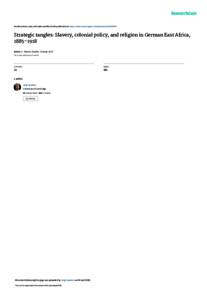وثيقة
Strategic tangles : slavery, colonial policy, and religion in German East Africa, 1885–1918.
المعرف
DOI: 10.1080/14788810.2017.1300753
المصدر
Atlantic Studies : Global Currents. v. 14, 4, p. 497-518
الدولة
United Kingdom.
الناشر
Routledge.
ميلادي
2017-10-02
اللغة
الأنجليزية
الملخص الإنجليزي
When Germany occupied Tanganyika in 1889, the mobilising rhetoric was built around ending slavery, which in turn was framed religiously, as a “Muslim” institution to be ended by “Christian civilisation.” However, while the German colonisers subsequently suppressed slave-raiding and the large-scale slave trade, they never abolished slavery itself or the private sale of slaves. Moreover, the political utility of framing slavery as an “Islamic” practice quickly faded as the German government rested its political rule on the established Omani and Swahili Muslim elites and their economic networks. Settlers and planters, in turn, were soon discussing how to solve the problem of labour shortage by coercive means. Only missionaries had an interest to continue framing slavery as a Muslim practice in order to raise support for their Christianising endeavours. This led to an extended conflict about German colonial policy, in which settlers invoked Islam as an ally for “civilising” Africans for modern labour regimes, while missionaries continued to highlight slavery as an aspect of the “Islamic danger” in the colony. The essay traces the German debate of slavery in East Africa with a special interest in how it was connected to perceptions of Christianity and Islam. It demonstrates that the vicissitudes of the debate about slavery were not so much governed by the issue of slavery itself as by entangled strategic interests in the colonial nexus of politics, economy, and religion.
ISSN
1478-8810
قالب العنصر
مقالات الدوريات

